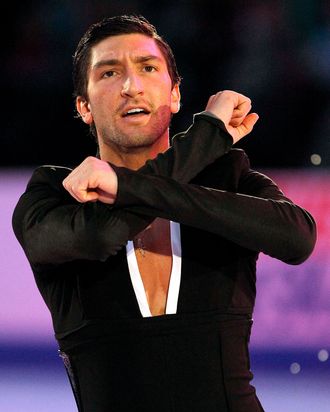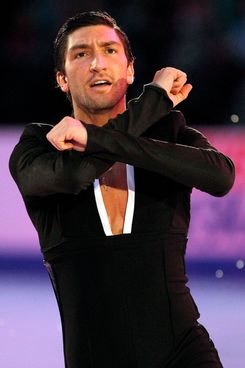

Tonight marks the encore presentation of Rise, a documentary commemorating the 50th anniversary of a tragic plane crash that killed all 72 people on board, including the entire 1961 U.S. World Figure Skating Team — 34 members of the U.S. figure-skating community in all. At 7:30pm, theaters across New York (and the rest of the country) will broadcast the movie for the second time only. The preshow features include a special piece by 2010 Olympic gold medalist and Dancing With the Stars runner-up Evan Lysacek, and proceeds benefit U.S. Figure Skating’s Memorial Fund, which was set up just after the crash. Jada Yuan spoke to Lysacek, who’s on the road with Smucker’s Stars on Ice. (They hit the Meadowlands on April 2.)
You’ve done everything but hand out flyers on the street to promote this movie.
I just think the movie will be a great tool for U.S. figure skating, because my generation of skaters growing up had so little information about the plane crash. I was touched by it, but I was also really educated by it. So many people, like my coach [Frank Carroll, who trained under nine-time U.S. ladies champion Maribel Vinson Owen, who died in the crash along with her two daughters, also U.S. champions], that were directly affected and devastated by the plane crash, are still at the forefront of the sport. And they’re not really eager to offer information or stories about it. It’s very painful and difficult for them to talk about. So even people within skating are not educated. What we found out when we were in New York for the premiere [on February 17] was that it was the worst sports accident in history because it wiped out not just athletes, but coaches, judges, and governing body officials as well. It literally wiped the sport out. And I think learning about it and seeing them rebuild and figuring out what our connections were to those victims really makes us feel closer and really made me know my coach better. This is someone I’ve spent every day with for the last nine years. I feel like from seeing that film I know him a little better.
The premiere was the first time all thirteen U.S. Olympic gold medalists [Peggy Fleming, Dorothy Hamill, Scott Hamilton, Brian Boitano, Kristi Yamaguchi, Tara Lipinski, Sarah Hughes, Tenley Albright, Dick Button, Carol Heiss Jenkins, Hayes Alan Jenkins, David Jenkins, and Lysacek] had been in a room together.
The event was really, really positive. We all got to see each other and catch up, just like you would with old friends. And the night before, Dick Button had a party at his home and invited all of the Olympic champions and their families and friends. He’s the greatest host, and even though he is one of the older ones, he’s always the jokester and prankster of the group.
He lives in New York?
On Park Avenue. That’s kind of my hood when I come to New York. I always stay at the Carlyle.
Do you ever sneak off to one of the public rinks in New York?
All the time. I absolutely love the skating rink at Chelsea Piers, the Sky Rink. I don’t know if the skaters there appreciate how unique it is, because so many rinks, anywhere, hockey or figure-skating rinks, they’re cinder blocks and there are, like, no windows in them. So to be able to skate with windows and have real light coming in and be able to look at the city, it’s one of my favorite places in the entire world to skate. I jump on freestyle sessions. They have them all day long.
What happens when you show up?
Not much. I think the skaters are just like, “Stay out of our way. We’re training, too.” [Laughs.] No, they’re always really nice. It’s like a family, because it is a small world, the sport. That’s where I’m most comfortable, on a training rink in any city in America doing kind of what I love most.
Do you ever have the urge to show off and do some quads?
Well, I recently started working on it again, so it’s probably 50-50 whether it would be showing off or someone needs to call an ambulance. It’s still kind of hit or miss. At least my foot is healed. I had a really bad foot injury from working on them before the Olympics. So it’s healed, and I’m getting back to that sort of training. But it’s definitely not showing off. It’s like, “Oh God. I hope no one’s watching. Okay, here we go.”
What kind of quad is it?
Toe loop, kicking with the left foot. Very good! You know your stuff.
Ha, not really. So I heard you went to a VMan party during Fashion Week that Kanye West attended. Did you talk to him?
No, we left when it started raining money and people were, like, crawling on the floor to pick up one-dollar bills. We said, “Uh, yeah, we gotta go.” So I didn’t get to talk to him or see him, but I run into him sometimes at the Mercer. I think he’s there quite often. Maybe I’ll stop him and say hi.
You listened to “Champion” obsessively at the Olympics, right?
I had a dream over a year before the Olympics that Kanye West’s “Champion” was the last song I listened to before I went out and skated, and in my dream, I won the Olympics. So when I was in Vancouver, I listened to that song over and over and over and over and over and over and over again, like, just a crazy amount of times, and it all came true. So I feel like I have to say thank you. He’ll probably think I’m insane, but I have to say thank you for that. Maybe I’ll tweet him. But that’s sort of a long story to put on Twitter, to try to wrap up in 140 characters.
Speaking of films, you must have related to Black Swan.
I liked it for, I think, different reasons than other people maybe enjoyed it. It showed a really accurate side of trying to succeed in an individual sport. Ballet is a tough sport, and I think people don’t realize this, and it’s kind of misunderstood in the way skating is. Skating is only in the spotlight every four years. You see such a minuscule moment of that athlete’s career and the hours that have gone in. But you know, we’re dressed up in our suit and we have our music and we’re ready to go and we have to make what we’re doing look easy, because that’s how we score points. If it looks difficult, we’re not doing our jobs. There’s, you know, a lot of positive emotion that goes along with it, but there’s a lot of deeper stuff. There’s a fear that it’s never going to happen, and there’s a lot of isolation in individual sports, and I think there’s a desperation, because sometimes you can’t explain why one person is able to do something and another person not. So you’re desperate. You want to do everything that anyone else can. And you want to succeed, and you want it to be you who is up there. But on the flip side, the margin for error is zero, and it takes absolute perfection. Tennis and gymnastics are the same way. When the cameras are rolling and your name is announced, you have to be perfect in that moment. It’s brutal. And I think people look at Blades of Glory and they’re like, “Oh, that’s ice skating.” That has absolutely nothing to do with competitive figure skating.
Have you ever played hockey?
I played yesterday in Chicago with a bunch of children. It was really fun. I was wearing rental hockey skates. But I do play sometimes for fun and I train with the L.A. Kings.
Your figure-skating skills translate?
Oh yeah, the basics are the same. They’re tremendous athletes, as far as team sports go, because of the stamina required. It’s kind of like treading water for the entire game. I’m sure you’ve skated. It’s not even easy to stand up. So they’re great athletes. I like to ski, too. And I really like to play tennis.
I once played an intramural hockey game in college, and the other team followed me around and asked me if I was in pain the entire game.
Whatever! You should be proud of yourself for trying. That’s what I always say. Trying new things is hard. Good for you. Hockey is great for girls. I have a lot of friends on the U.S. Women’s team and they’re all really well-adjusted and really smart. They’re not like the stereotype that you would think. Even though they have their helmet on, they put makeup on beforehand.
Will you skate in the 2014 Olympics?
I’m weighing options now. I mean, I don’t want to disappoint anyone by jumping back in the field of play now and not being able to live up to expectations. The skating season that’s going on now is the first that I’ve missed in decades. So I’m kind of watching and analyzing, and as I tour with Stars on Ice, I train every second that I possibly can. I want to be in great shape when I make that decision whether or not to go back into competition next season. But it’s also rough seeing what the other top guys in the world are doing and seeing whether I think I can hang with them, and whether or not I can be competitive. And if not, I’m a realist. I’ll be the first one to say it.
What’s your alternate career path?
I love learning, and I’ve been putting off going to school. I did some speaking engagements for Deloitte, and I spoke at some great schools, including Columbia University. And I sort of imagined my life being a student and going to Columbia and spending time exploring other interests, and that seemed like a real viable option. Also, I’ve been in L.A. a long time, and I know quite a few people in the entertainment industry, and I think maybe I’d like to try acting, or at least keep it as a hobby. It’s weighing options at this point, but I think the most positive thing in my life is that I’m skating every night, and I didn’t do a whole lot of that for the past year. It was hard to be away from the ice.
Maybe you’ll end up being a skating investment banker actor.
Exactly! How do you know me so well? That’s a real option, to go to school and continue to train, and instead of just popping into Chelsea, that would be my training base. We’ll see. Anything is possible right now.